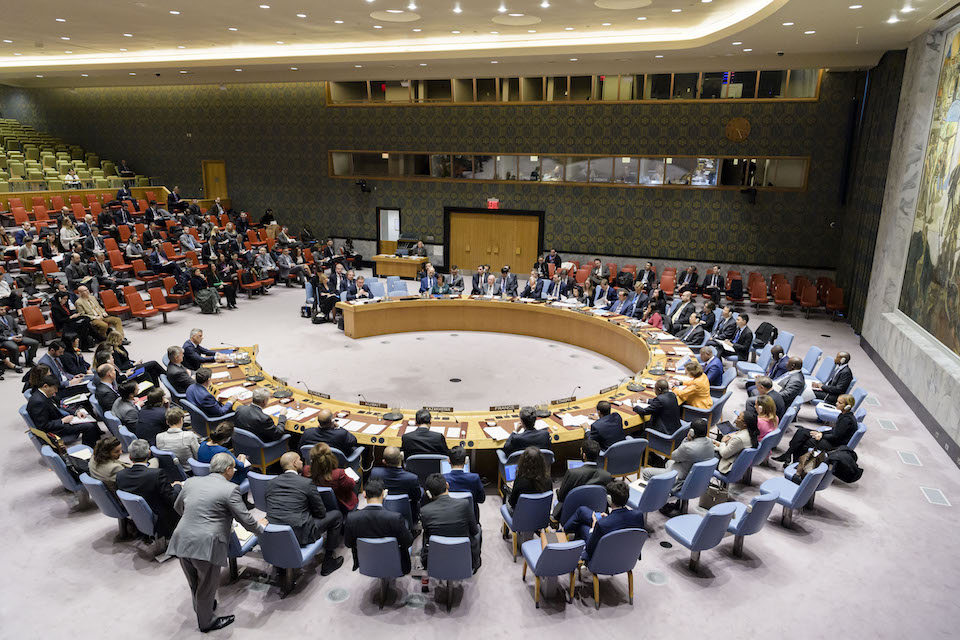Obstacles to peace in Israel and Palestine
Statement by Ambassador Karen Pierce, UK Permanent Representative to the UN, at the Security Council Briefing on the Middle East

Thank you very much Mr President. Before I start, could I through the American delegation pass on a tribute to Ambassador Haley’s time on the Council. Her ambition for the Council and her commitment to delivery and effectiveness have really helped move issues and ourselves forward. So please thank her very much indeed for that. And I’ll come on to what she said about the peace process a little bit later.
Thank you to the Special Coordinator; I completely echo the Swedish Ambassador in paying tribute to you and your team in such difficult circumstances.
Mr President, as others have noted, it’s two years since this Council passed Resolution 2334 and no steps have been taken by Israel to cease settlement activity during this period. In fact, settlement activity has continued. The government of Israel has also moved forward with retroactive legislation of the outpost Havat Gilad. We are deeply concerned about the Government’s announcement last week to retrospectively legalise thousands more homes in the West Bank, construct 82 new residential units in the offshore settlement and advance the construction of two new industrial zones in the West Bank.
The United Kingdom’s position on the settlements is clear: they are illegal under international law. Settlements present an obstacle to peace and they threaten the physical viability of a two-state solution. And that’s why we supported Security Council 2334. And we urge the government of Israel to reverse its policy of settlement expansion.
At the same time, we see continued demolitions take place, including in East Jerusalem. We are concerned by the demolition of 16 small businesses in the Shu’fat refugee camp on 21 November. There are no valid term plans for the camp and this forces Palestinians to resort to building without permits. We are also closely monitoring developments in Sheikh Jarrah and Silwan where many hundreds of Palestinians are at risk of eviction. This risk is exacerbated by recent Israeli legislative developments and court rulings. We will continue to support the Palestinian presence in East Jerusalem Mr President, including through legal aid programs for those facing demolition or eviction.
We welcome the temporary postponement of plans to demolish the Bedouin community of Khan al-Ahmar but we remain gravely concerned about the fate of this community. The United Nations has said this demolition could amount to forcible transfer in violation of International Humanitarian Law. As I’ve said before in this Chamber, Israel is in no way obligated to demolish Khan al-Ahmar. It has the power to change its mind and we urge it to do so.
We look to the Israeli government to provide a clear transparent route for Palestinian construction to end the cycle of illegal building and demolitions.
Turning to some of the other issues the Special Coordinator raised, I have no hesitation in joining him in unreserved condemnation of all terrorist attacks no matter on whom they are perpetrated. We share his concern about the intensity of these attacks and we send our condolences to the victims of both sides. I note in the context of the Hamas resolution that was in the General Assembly recently, I note that it passed with a majority of 30. It would have passed formally had there not been an attempt to require two-thirds but I think that majority Mr President of 30 is very significant and it shows in which direction the tide is going.
Turning to the humanitarian situation in Gaza, yesterday the United Kingdom announced an additional $7 million of emergency funding to UNRWA to provide food to refugees in Gaza and the immediate priority must be to ease restrictions on movement and access, reduce tensions and avoid another conflict. And we expect Hamas, the Palestinian Authority and Israel to do their utmost to prevent escalation.
We continue to support tangible steps towards intra-Palestinian reconciliation and uniting the Gaza Strip and the West Bank under the effective functioning of the Palestinian Authority. And we welcome the efforts of the Special Coordinator in this respect.
Mr President, I’d like to address what Ambassador Haley said about the peace process. We very much welcome the confirmation that a US plan is ready and we look forward receiving it and studying it in due course. We agree that both sides will clearly be asked to make difficult decisions to achieve peace and we agree that Europe and Arab states will have an important role in supporting any peace plan. We look now to the parties to take steps to build confidence and to build the right environment so any peace process can succeed.
For the United Kingdom, we are very clear that the well-known parameters are the most viable framework for a just and lasting peace. First, there must be an agreement on the borders of the two states based on the 4 June 1967 lines with equivalent land swaps as may be agreed between the parties. Second, security arrangements for the Palestinians must respect their sovereignty, show the occupation is over and, for the Israelis, they must protect their security. Third, a just, fair, agreed and realistic solution to the refugee question must be put in place. Fourth, the aspirations of both parties for Jerusalem need to be fulfilled and a way found, through negotiations, to resolve the status of Jerusalem as the future capital of both states.
It follows from this Mr President that we continue to believe that a two state solution remains the best outcome of a peace process and the United Kingdom remains committed to working with both parties, regional and international partners in support of this goal. Thank you very much.